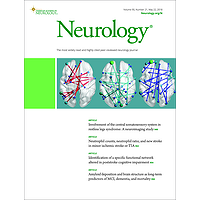ObjectiveTo identify people with epilepsy who will not achieve a 12-month seizure remission within 5 years of starting treatment.MethodsThe Standard and New Antiepileptic Drug (SANAD) study is the largest prospective study in patients with epilepsy to date. We applied a recently developed multivariable approach to the SANAD dataset that takes into account not only baseline covariates describing a patient's history before diagnosis but also follow-up data as predictor variables.ResultsChanges in number of seizures and treatment history were the most informative timedependent predictors and were associated with history of neurologic insult, epilepsy type, age at start of treatment, sex, and having a first-degree relative with epilepsy. Our model classified 95% of patients. Of those classified, 95% of patients observed not to achieve remission at 5 years were correctly classified (95% confidence interval [CI] 89.5%-100%), with 51% identified by 3 years and 90% within 4 years of follow-up. Ninety-seven percent (95% CI 93.3%-98.8%) of patients observed to achieve a remission within 5 years were correctly classified. Of those predicted not to achieve remission, 76% (95% CI 58.5%-88.2%) truly did not achieve remission (positive predictive value). The predictive model achieved similar accuracy levels via external validation in 2 independent United Kingdom-based datasets.ConclusionOur approach generates up-to-date predictions of the patient's risk of not achieving seizure remission whenever new clinical information becomes available that could influence patient counseling and management decisions.

Identification of patients who will not achieve seizure remission within 5 years on AEDs
Review badges
0 pre-pub reviews
0 post-pub reviews



